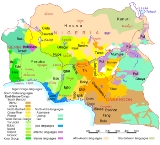
Volta–Niger languages
Encyclopedia
The Volta–Niger family of languages, also known as West Benue–Congo or East Kwa, is one of the branches of the Niger–Congo language family
, with perhaps 50 million speakers. Among these are the most important languages of southern Nigeria, Benin, Togo, and southeast Ghana: Yoruba
, Igbo
, Bini
, Fon
, and Ewe
.
These languages have variously been placed within the Kwa
or Benue–Congo families, but Williamson & Blench (2000) separate them from both. The boundaries between the various branches of Volta–Niger are rather vague, suggesting diversification of a dialect continuum
rather than a clear split of families.
The constituent groups of the Volta–Niger family, along with the most important languages in terms of number of speakers, are as follows (with number of languages for each branch in parenthesis):
The Yoruboid languages and Akoko were once linked as the Defoid
branche, but more recently they, Edoid, and Igboid have been suggested to be primary branches of an as-yet unnamed group, often abbreviated . Similarly, Oko, Nupoid, and Idomoid are often grouped together under the acronym . Ukaan is an Atlantic–Congo language, but it is unclear if it belongs to the Volta–Niger family; Blench suspects it is closer to Benue–Congo.
Niger–Congo languages
The Niger–Congo languages constitute one of the world's major language families, and Africa's largest in terms of geographical area, number of speakers, and number of distinct languages. They may constitute the world's largest language family in terms of distinct languages, although this question...
, with perhaps 50 million speakers. Among these are the most important languages of southern Nigeria, Benin, Togo, and southeast Ghana: Yoruba
Yoruba language
Yorùbá is a Niger–Congo language spoken in West Africa by approximately 20 million speakers. The native tongue of the Yoruba people, it is spoken, among other languages, in Nigeria, Benin, and Togo and in communities in other parts of Africa, Europe and the Americas...
, Igbo
Igbo language
Igbo , or Igbo proper, is a native language of the Igbo people, an ethnic group primarily located in southeastern Nigeria. There are approximately 20 million speakers that are mostly in Nigeria and are primarily of Igbo descent. Igbo is a national language of Nigeria. It is written in the Latin...
, Bini
Edo language
Edo is a Volta–Niger language spoken primarily in Edo State, Nigeria. It was and remains the primary language of the Edo people of Igodomigodo. The Igodomigodo kingdom was renamed Edo by Oba Eweka, after which the Edos refer to themselves as Oviedo 'child of Edo'...
, Fon
Fon language
Fon is part of the Gbe language cluster and belongs to the Volta–Niger branch of the Niger–Congo languages. Fon is spoken mainly in Benin by approximately 1.7 million speakers, by the Fon people...
, and Ewe
Ewe language
Ewe is a Niger–Congo language spoken in Ghana, Togo and Benin by approximately six million people. Ewe is part of a cluster of related languages commonly called Gbe, spoken in southeastern Ghana, Togo, and parts of Benin. Other Gbe languages include Fon, Gen, Phla Phera, and Aja...
.
These languages have variously been placed within the Kwa
Kwa languages
The Kwa languages, often specified as New Kwa, are a proposed but as-yet-undemonstrated family of languages spoken in the south-eastern part of Côte d'Ivoire, across southern Ghana, and in central Togo...
or Benue–Congo families, but Williamson & Blench (2000) separate them from both. The boundaries between the various branches of Volta–Niger are rather vague, suggesting diversification of a dialect continuum
Dialect continuum
A dialect continuum, or dialect area, was defined by Leonard Bloomfield as a range of dialects spoken across some geographical area that differ only slightly between neighboring areas, but as one travels in any direction, these differences accumulate such that speakers from opposite ends of the...
rather than a clear split of families.
The constituent groups of the Volta–Niger family, along with the most important languages in terms of number of speakers, are as follows (with number of languages for each branch in parenthesis):
The Yoruboid languages and Akoko were once linked as the Defoid
Defoid languages
The Defoid languages are a now-abandoned branch of the Benue–Congo language family. The name of the group derives from the fact that nearly all of the ethnic groups who speak member languages refer to the city of Ilé Ifè as their place of origin — Defoid = èdè + ifè + oid...
branche, but more recently they, Edoid, and Igboid have been suggested to be primary branches of an as-yet unnamed group, often abbreviated . Similarly, Oko, Nupoid, and Idomoid are often grouped together under the acronym . Ukaan is an Atlantic–Congo language, but it is unclear if it belongs to the Volta–Niger family; Blench suspects it is closer to Benue–Congo.

